|
|
|
Sort Order |
|
|
|
Items / Page
|
|
|
|
|
|
|
| Srl | Item |
| 1 |
ID:
108086
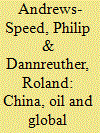

|
|
|
|
|
| Publication |
London, Routledge, 2011.
|
| Description |
xiv, 233p.
|
| Standard Number |
9780415603959, hbk
|
|
|
|
|
|
|
|
|
|
|
|
Copies: C:1/I:0,R:0,Q:0
Circulation
| Accession# | Call# | Current Location | Status | Policy | Location |
| 056348 | 338.272820951/AND 056348 | Main | On Shelf | General | |
|
|
|
|
| 2 |
ID:
062064
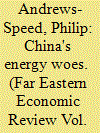

|
|
|
| 3 |
ID:
121315
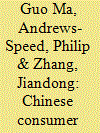

|
|
|
|
|
| Publication |
2013.
|
| Summary/Abstract |
Energy saving is now an important component of China's energy policy. This paper reports the findings of a survey carried out in 2009 and 2010 of 246 citizens at different locations in the municipality of Chongqing in order to reveal information about attitudes towards energy and energy saving in the context of household electrical appliances. This study shows that citizens in Chongqing receive relatively little information and guidance on how to save energy in the home and that their stated level of knowledge on this subject is also rather limited. Respondents showed some willingness to save energy as long as this did not reduce their comfort and convenience, and they appeared likely to respond to economic incentives, such as high electricity prices or discounts on appliances. But they seemed to be unaware of the potential for information to help them save energy. The survey also demonstrated a high degree of heterogeneity across society with respect to sources of information and trust in those sources and with respect to attitudes to energy saving at home. These results show that the government needs to substantially adjust its strategies for promoting household energy saving.
|
|
|
|
|
|
|
|
|
|
|
|
|
|
|
|
| 4 |
ID:
081279
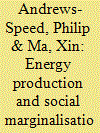

|
|
|
| 5 |
ID:
128452
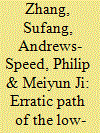

|
|
|
|
|
| Publication |
2014.
|
| Summary/Abstract |
The last twenty years have seen the growth of both solar PV manufacturing capacity and deployment in China, yet this growth has followed a very erratic path. This study applies the concept of socio-technical regime to identify factors which have made this path so erratic. We examine four stages in China's solar PV policy from mid-1990s to 2013 and show that each is characterized by different combinations of policy program. These changes in government policy and in the resultant trajectory of the solar PV sector are attributed to three main sets of variables. The most important of these are events which shape the wider policy priorities of China's government. Secondary factors include the government's poor management of the policy interaction between the domestic solar PV manufacturing industry and the deployment of solar PV across the country, as well as policy learning within government. The general lesson from this study is that the development path of a single element of a national strategy for the low-carbon transition is likely to be erratic, subject as it is to a range of political and economic forces, and to experimentation and learning.
|
|
|
|
|
|
|
|
|
|
|
|
|
|
|
|
| 6 |
ID:
125724
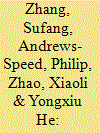

|
|
|
|
|
| Publication |
2013.
|
| Summary/Abstract |
This paper analyzes China's policy approach to renewable energies and assesses how effectively China has met the ideal of appropriate interactions between renewable energy policy and renewable energy industrial policy. First we briefly discuss the interactions between these two policies. Then we outline China's key renewable energy and renewable industrial policies and find that China's government has well recognized the need for this policy interaction. After that, we study the achievements and problems in China's wind and solar PV sector during 2005-2012 and argue that China's policy approach to renewable energies has placed priority first on developing a renewable energy manufacturing industry and only second on renewable energy itself, and it has not effectively met the ideal of appropriate interactions between renewable energy policy and renewable energy industrial policy. Lastly, we make an in-depth analysis of the three ideas underlying this policy approach, that is, the green development idea, the low-carbon leadership idea and indigenous innovation idea. We conclude that Chinas' policy approach to renewable energies needs to enhance the interactions between renewable energy policy and renewable energy industrial policy. The paper contributes to a deeper understanding of China's policy strategy toward renewable energies.
|
|
|
|
|
|
|
|
|
|
|
|
|
|
|
|
| 7 |
ID:
121289
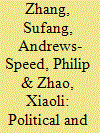

|
|
|
|
|
| Publication |
2013.
|
| Summary/Abstract |
This paper identifies and explains how political and institutional factors have determined the relative successes and failures of China's wind power policy over the period 2005-2011. It finds that China has made significant progress in pursuing its wind power policy in terms of cumulative installed capacity, wind turbine manufacturing industry development and wind turbine cost, and argues that these achievements can be attributed to the political motives and institutional arrangements of the Chinese government as well as to institutional changes. On the other hand, the paper finds that there are two prominent policy failures, namely the low proportion of grid-connected capacity and the rising trend of wind turbine incidents. These have undermined the efficiency and effectiveness of China's wind power program. The paper holds that the institutional sources for the first policy failure lies in the preference for setting wind power development targets in terms of installed capacity rather than generation and in coordination problems while the second policy failure lies in the lack of state technical codes for wind power integration and the unfair competition from the large state-owned power companies. The paper contributes to the academic literature on the political and institutional roles in China's wind power policy.
|
|
|
|
|
|
|
|
|
|
|
|
|
|
|
|
| 8 |
ID:
089979
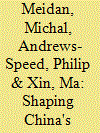

|
|
|
|
|
| Publication |
2009.
|
| Summary/Abstract |
This article develops an analytical framework for examining China's energy policy-making processes, and uses it to explain the recent shifts in the country's energy priorities. The authors analyze the decisive factors in China's energy sector reforms by looking at the different stages from agenda setting, through policy choices, to decision making and implementation. The article attempts to identify the actors behind, the drivers for, and the constraints to, the progress of energy sector reforms in China since 1993 and to follow the evolution of these drivers and constraints. This will allow a better understanding of the possible future trends of energy sector reform, the institutional limits to policy change and the constraints to implementation.
|
|
|
|
|
|
|
|
|
|
|
|
|
|
|
|
|
|
|
|
|